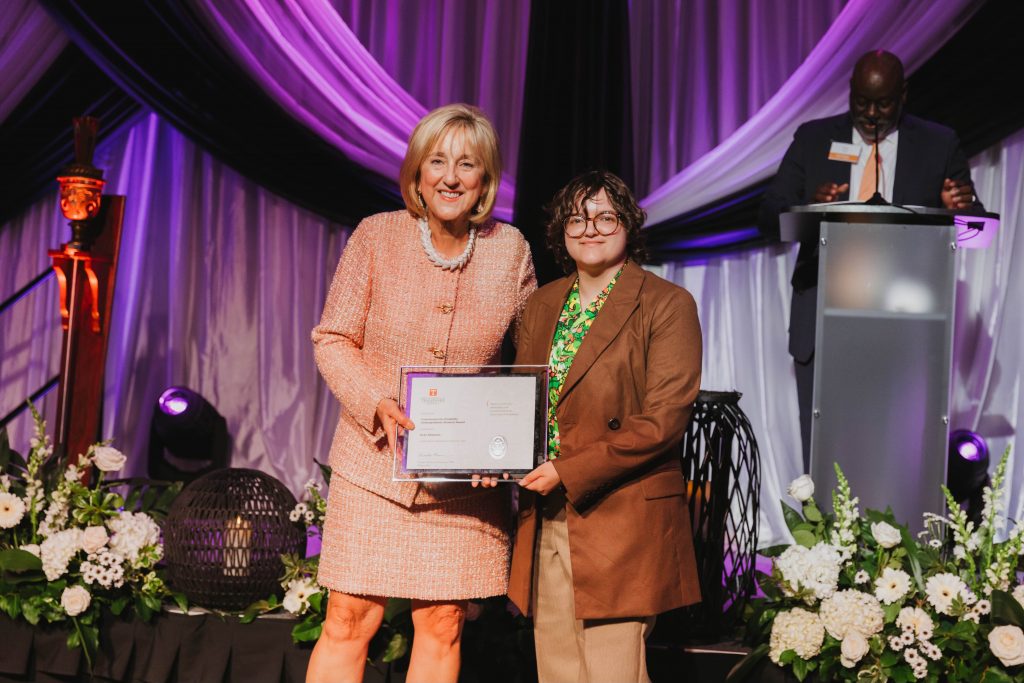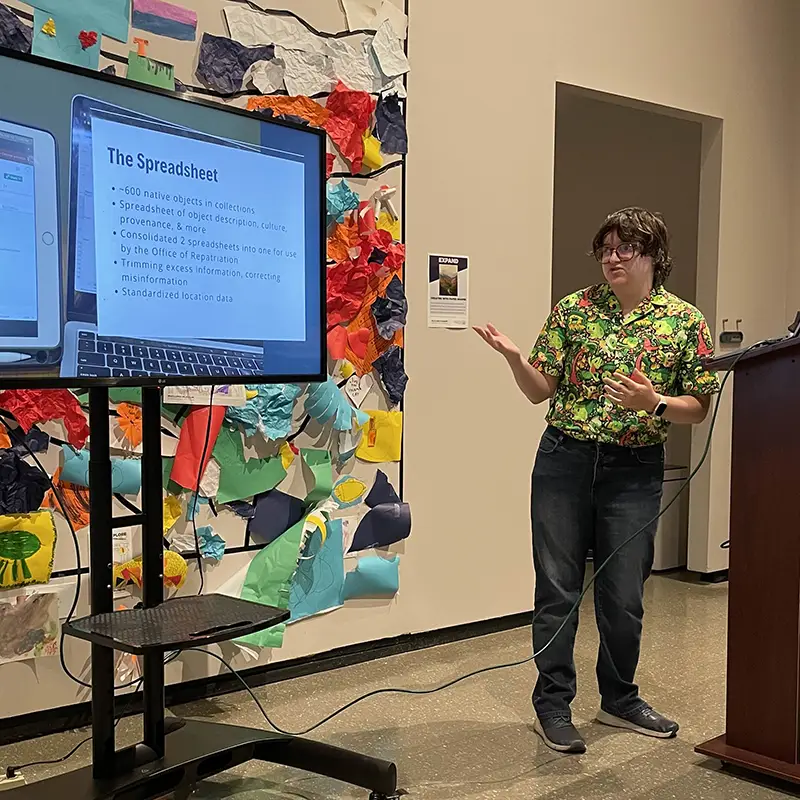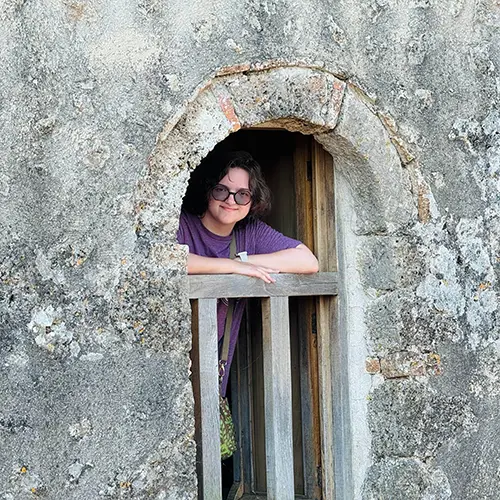Dual Major in Classics, Religious Studies Creates Multifaceted Education

When Evan Shannon was in middle school, two social studies units made a lasting impression: religion and the ancient world. This spring he graduated from the University of Tennessee, Knoxville, with dual bachelor’s degrees in religious studies and classics, with a concentration in Greek.
Then he plans to pursue a master’s degree in library sciences and become an academic librarian. “I’ve always loved information more than anything else,” Shannon said.
Tapping into a wide range of opportunities at UT, he worked in one of the campus libraries, interned at the McClung Museum of Natural History and Culture, traveled to Greece for study abroad, and earned recognition for supporting disabled people.
Shannon said he was drawn to UT by the strength of the programs for classics and religious studies, then found not only brilliant scholars but faculty who were supportive when he experienced personal difficulties, allowing him to continue studies during a difficult third year that included a hospitalization.
At Home in the Library
Shannon’s interest in a future library career was evident early.
“I ran a makeshift library out of my childhood bedroom,” he explained. Three full bookshelves stood in parallel rows, the volumes arranged by author’s last name. He’d encourage friends to borrow a book when they visited. “I’d tape a little checkout slip into the front cover and would give them a due date and everything. It was a very serious operation,” he said with a laugh.
He spent so much time in the local public library as a child that it felt like a second home. Volunteering in the youth services department as a teen, Shannon easily met the required 80 hours of community service for the Tennessee Scholars honor at high school graduation.
Finding information is more interesting to Shannon than reading, and as a student at UT, he has helped others while working at the Webster C. Pendergrass Agriculture and Veterinary Medicine Library. He has hunted down journal articles in addition to answering questions, printing posters, and designing displays.
Delving Into McClung Collections

In spring 2024, Shannon completed a curatorial internship with the McClung museum, researching objects and standardizing information recorded about them.
“I was really surprised by just the vastness of McClung collections,” he said, noting they range from Egyptian artifacts to freshwater mussels. “I researched some Alaska Native garments, a 1904 Haggadah (a Jewish text used during the Passover seder), and a set of Roman game pieces.”
The museum held professional development sessions each week for its interns, including field trips to other local museums. “As an aspiring information professional, exploring so many aspects of information sciences through my internship at McClung and my work at the library has been very helpful and educational in planning my next steps,” Shannon said.
The museum internship was part of his religious studies program, as was an undergraduate research assistantship. Working with Associate Professor Erin Darby and Lecturer Michael Naparstek, he vetted videos and articles to prepare resources for Knox County educators to teach about religion.
“I want every student to feel very intrigued and stimulated by religion,” Shannon said.
Traveling to Greece for Study Abroad
A $4,500 award from the Society for Classical Studies allowed Shannon to take his first trip abroad in summer 2024. He received a Frank M. Snowden Jr. Undergraduate Scholarship for students from underrepresented/underprivileged backgrounds to attend the American School for Classical Studies in Athens, an 18-day program.
”We went to 37 archaeological sites and eighteen museums, heard 20 presentations from participants and six guest lectures, and I personally saw and counted 98 cats,” Shannon recalled.
“My favorite sites were the Nekromanteion and the Sacred Oak of Dodona, as they are both ancient sites where ritual activity has persisted. People leave coins in both sites, and people tie wishes to the Sacred Oak, and I think that continuity is beautiful,” said Shannon, who also did both.
Studying Disabilities

During the trip to Greece, he said, “I also loved seeing the sites dedicated to Asklepius, god of healing, and, maybe more so, the ways that museums displayed information about Asklepius.”
In ancient Greece, archeological evidence shows ramps at some temples, but mostly just at those for gods of healing. When Shannon visited Greek museums in 2024, he also noted the most accessible displays also tended to be limited. As an undergraduate at UT, Shannon set out to research disabled characters in myth but found few sources. So, he shifted to explore the lack of research on the topic. At the Tennessee Undergraduate Classics Research Conference, he presented a paper titled, “Old Classicists Are Lame and Ancient Greeks Used Canes: Washing Off the Romanticization of Ancient Peoples with Disability Studies.”
Vol Means Caring
Shannon also has devoted time to ensuring UT is more accessible, serving as an undergraduate representative on the Access & Engagement Committee.
During the 2023-2024 academic year, he helped plan a board game night, co-hosted with the Classics Club and the Tabletop Gaming Club, and spent hours ensuring promotional materials were accessible by researching information about color-blindness and typefaces.
At the Chancellor’s Honors Banquet in 2024, Shannon received the Commission for Disability Undergraduate Student Award, given for furthering recognition of and support for people with disabilities at UT. He also received a $2,000 scholarship from the UT Pride Center, which honors students’ advocacy for the lesbian, gay, bisexual, transgender, and queer (LGBTQ+) community on campus, in the Knoxville community, or throughout East Tennessee.
“Being a Vol for me is caring about every person on campus, from first-years to staff and everyone in between,” Shannon said. “I especially take pride in working alongside people that are often marginalized, particularly disabled students, low-income students, LGBT+ students, and Native American students. “As all of the above, I’ve dealt with my fair share of discrimination and barriers to success, as well as feeling out of place in the UT community, and I don’t want anyone else to feel that way,” he said. “We’re here, and we deserve to be.”
By Amy Beth Miller